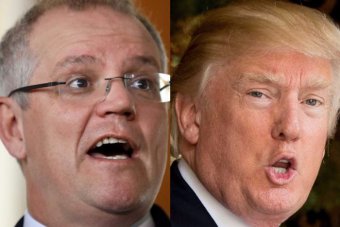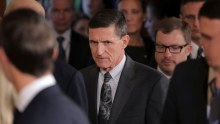TPP: 'Australia first' trade policy outlined by Scott Morrison after Donald Trump's withdrawal
Updated
Treasurer Scott Morrison has outlined an "Australia first" trade policy after US President Donald Trump signed an executive order to leave the Trans-Pacific Partnership (TTP) using similar language.
Key points:
- Trump outlines "America first" position on trade, taxes, immigration and foreign affairs
- But Morrison says Australia will not walk away from multilateral trade deals
- Japan and Canada both admit deal cannot go ahead without US
But Mr Morrison is adamant Australia will continue to pursue free trade agreements and new opportunities in Asian markets, insisting it remains in the national interest to do so.
Mr Morrison, who is in the United Kingdom for finance and affordable housing talks, told Bloomberg Australia would not walk away from multilateral trade deals.
"Australia is a trading nation and an Australia first policy does embrace trade and foreign investment and all of these things, so our economic interests are very much aligned with that approach," he said.
"We will pursue our interests and the United States will define theirs in their own way under the new US President, and I will leave it to them to make their judgements on those issues."
Mr Trump outlined an "America first" position on trade, taxes, immigration and foreign affairs during his inauguration address in Washington, insisting every decision would be made to benefit American workers.
Mr Morrison said Mr Trump's decision to withdraw from the TPP was not unexpected and said Australia would continue to "get on with it".
"There's still a lot that can be gained, and we intend to continue to pursue that, where those opportunities persist and where there is potential for other partners to step into this," he said.
"We have had excellent arrangements finalised with China and South Korea and Japan and the TPP was an important part of this, and we respect the decision made by the President."
Shorten: The TPP is dead
But Opposition Leader Bill Shorten criticised the Government for refusing to admit the TPP is dead, despite statements by Australia's key economic partners.
Prime Minister Malcolm Turnbull and Trade Minister Steve Ciobo have insisted Australia could still salvage a trade deal with the 11 remaining TPP signatories — including Japan, Malaysia and Singapore.
But according to The Japan Times, Tokyo has turned down a proposal to revise the TPP deal, saying the deal is "meaningless" without the US.
Canadian Foreign Affairs Minister Chrystia Freeland has also admitted the TPP cannot go ahead without the US as a ratifying country.
"The Japanese Government has come out today and said that without the United States, this trade treaty is meaningless," Mr Shorten said.
"Malcolm Turnbull doesn't have to take my word for it — maybe he should take the Japanese Government's word for it."
'We expect cool heads to prevail'
The Treasurer said any trade war between the US and China would not benefit anyone and called for pragmatic and patient leadership.
"We expect cool heads to prevail on these sorts of things and that ultimately people will hopefully take a very pragmatic approach," he said.
Mr Morrison said Australian officials had made their desire for a free trade agreement with the UK clear, although he noted no deal can be made until the UK formally leaves the European Union (EU).
"We are very much proponents on strategic patience while these arrangements are finalised," he said.
"It is in everybody's interests that these things get sorted out in a very pragmatic and patient way.
"Whether it is cooler heads prevailing when it comes to China and the US on trade, everybody is going to win from that sort of approach."
Australia's High Commissioner to the United Kingdom, Alexander Downer, said it was conceivable Britain would want to join the TPP once leading the EU.
"They've raised the issue of the TPP and shown some interest in the TPP, but of course the future of the TPP is still in question so we'll have to see how it evolves," he told ABC News.
Mr Downer also noted the uncertain future around the TPP, as well as the UK's geographical distance from the group of nations who negotiated the agreement.
Topics: business-economics-and-finance, trade, world-politics, international-law, us-elections, united-states, australia, asia
First posted










